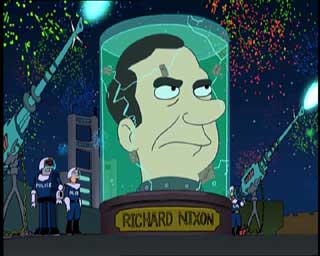Socialism Creating Terrorists
John van Heyking has an outstanding guest commentary posted at the Ashbrook Center entitled The Riots of Ramadan. He poses that Tocqueville's nightmare of an impotent welfare state crushed under its unfulfillable promises has come to fruition, and the result of the French nanny-state is the what we've seen the past two weeks. Some important quotes follow, but it's worth your time to read it in its entirety:
For instance, Prime Minister Dominique de Villepin's longstanding economic policy has been to use the state to provide jobs while setting up trade barriers to protect French companies. Of course, this policy is self-contradictory and typifies the sclerosis of the French political class and perhaps of the Fifth Republic itself. With unemployment at ten percent for non-immigrants, the French economy is too sluggish and dragged down by the welfare state to generate jobs.
The government's policy of housing these immigrants in public housing projects compounds the problem. Americans will be familiar with the "projects" that originated with Lyndon B. Johnson's Great Society programs and with the various criminal and social pathologies they created. The lack of private ownership and the lack of self-respect that accompanies it produce the conditions for these rioters. Nicholas Sarkozy was criticized for labeling the rioters "scums" because he was supposedly insensitive to the problems caused by their unemployment. To his mind, they are scums because they destroy their own communities. The press has interviewed several shop-owners whose shops were attacked and who agree with Sarkozy. However, in another sense they are not destroying their own communities because their communities are not their own. This is why one local community leader explained that the ideals of the French Revolution liberty, equality, and fraternity have not trickled down to them. With no sense of ownership of their own communities, the rioters view themselves as dependents or wards of the state. The projects were meant to enable immigrant populations to practice self-government Tocqueville's civil associations. Amir Taheri compares this system to the "millet" system of the old Ottoman Empire where Christian and Jewish communities ran their own affairs under the more-or-less tolerant umbrella of Islamic officialdom. However, with rioters pelting their own imams with rocks, it is clear that they reject even this level of association with the broader French culture. Therefore, the "root causes" argument once again fails to account for their lack of pride in themselves. The essence of mass man, that is to say those who lack a sense of their own personality, gets enacted through such acts of violence. The violence might "express" desperation, anger, or lack of self-ownership, but it has no strategic or political goal. Villepin's attempts to engage in "dialogue" with the rioters might constitute salutary window-dressing of a benevolent government policy, but it is at best a stop-gap measure that has come too late because his government was too timid in stamping out the violence.
[...]
For [Olivier] Roy, political Islam is very much a modern phenomenon because it is driven by masses of displaced or deterritorialized Muslims who have left their traditions and are searching for an "essential" Islam. Roy notices a strongly individualistic streak among them. For instance, he observes that 9/11 bomber Mohammad Atta's suicide note contained significantly more references to himself than to Allah, which he takes signifies a modern obsession with the self. The rioters are indeed Islamists, as evidenced by their frequent chant, "Allahou Akbar!" "God is great!" Of course, it is difficult if not impossible to identify the "essence" of a 1,500 year old tradition. Ironically, Islamists do what Westerners do when the latter express their "Orientalism" in reducing that complex tradition to a few slogans such as, "Islam is a religion of peace" and "Islam is a religion of war." Islamists paradoxically, and perversely, treat themselves as "the Other" in reducing their own tradition to some kind of "pure Islam." Doing so enables them to identify (and destroy) those deemed apostate but also because Muslims can no longer take their religion for granted as something connected with the soil. Their traditions have been uprooted over the past several generations, which contributes to a radicalized sense of identity politics.


<< Home